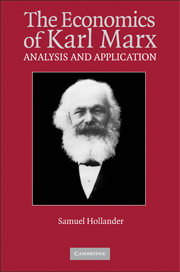Book contents
- Frontmatter
- Contents
- Preface
- Introduction
- Part One CAPITAL: PRINCIPLE FEATURES OF THE MARXIAN “CANON”
- Part Two ORIGINS: MARX IN THE 1840s
- Part Three A “SECOND DRAFT” OF CAPITAL: THE GRUNDRISSE 1857–1858
- 8 1857–1858 I: Surplus Value
- 9 1857–1858 II: Value “Realization”
- Part Four A “THIRD DRAFT” OF CAPITAL: THE ECONOMIC MANUSCRIPTS 1861–1863
- Part Five TOPICS IN APPLICATION
- Conclusion: A Recapitulation and Overview
- Appendices
- Bibliography
- Index
9 - 1857–1858 II: Value “Realization”
Published online by Cambridge University Press: 25 June 2009
- Frontmatter
- Contents
- Preface
- Introduction
- Part One CAPITAL: PRINCIPLE FEATURES OF THE MARXIAN “CANON”
- Part Two ORIGINS: MARX IN THE 1840s
- Part Three A “SECOND DRAFT” OF CAPITAL: THE GRUNDRISSE 1857–1858
- 8 1857–1858 I: Surplus Value
- 9 1857–1858 II: Value “Realization”
- Part Four A “THIRD DRAFT” OF CAPITAL: THE ECONOMIC MANUSCRIPTS 1861–1863
- Part Five TOPICS IN APPLICATION
- Conclusion: A Recapitulation and Overview
- Appendices
- Bibliography
- Index
Summary
Introduction
The methodological “introduction” to the Grundrisse perceives the production process as providing the basis for surplus value interpreted as unpaid labor time, thus according production priority over distribution and exchange (see Chapter 8, p.236). That the worker “exchanges the value-positing activity for a predetermined value, regardless of the result of his activity” (MECW 28: 248, emphasis added, cited Chapter 8, p.241) captures the perspective in question. We have traced through the major ramifications of the doctrine both for the understanding of profit and the value-price relation (the Transformation). We must now face the problem of interpreting the priority accorded production as “starting point” of the economic system. For it is also readily allowed that an “organic entity” with numerous “interactions” is involved, and in particular that “production is determined by the needs of consumption. There is an interaction between the different moments. This is the case with any organic entity” (37). This same perspective is repeatedly encountered in the body of the Grundrisse.
This matter seems to have troubled Dobb who attempted to solve it by attributing to Marx an emphasis on circulation or Exchange that reflects less his own position than that of those with whom he took issue (Dobb 1982: 80). The problem is that by placing such great weight on problems relating to “realization” as endemic in the capitalist-exchange system Marx seems to undermine the priority he himself at this time accorded production in accounting for surplus value.
- Type
- Chapter
- Information
- The Economics of Karl MarxAnalysis and Application, pp. 268 - 290Publisher: Cambridge University PressPrint publication year: 2008



